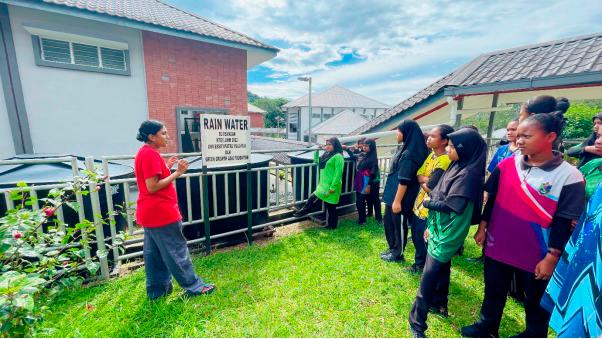GERIK: A mere day without water in the city can cause distress for its residents.
However, the Temiar indigenous villagers at Pos Kemar have faced years without clean water for drinking and other purposes.
As the government continues its efforts to address the problem in the village, the Universiti Putra Malaysia (UPM) Department of Environmental and Occupational Health has implemented a rainwater harvesting system at the RPS Pos Kemar primary school.
Project lead Dr Sarva Mangala Praveena said the initiative aims to provide a reliable clean water supply, especially during times when water is scarce.
“This village’s remote location makes it hidden from sight. It is only accessible with a four-wheel drive via logging roads from Sungai Siput or by boat from the Banding Jetty.
“Due to its location, it has led to a lack of clean water supply, especially at the school. Their situation is dire.”
Sarva Mangala said the school’s water pump, which extracts water from the nearby Temengor River, often yields water with high turbidity levels, rendering it unsuitable for consumption or any other purpose.
She said although water filtration equipment with ultrafiltration and reverse osmosis systems is available, it provides a limited quantity of clean water, making it heavily dependent on rainfall, especially during dry seasons.
In response to this, Sarva Mangala said the significance of rainwater harvesting as a sustainable, environmentally friendly solution with low construction and maintenance costs was considered.
“It is a small-scale technology that can be applied in any community environment and requires minimal management training.
“Rainwater harvesting promotes sustainable water management practices by utilising natural resources such as rainwater instead of relying only on finite water sources. Students learn about the benefits of reducing their reliance on treated water from municipal supplies.”
Sarva Mangala said the system installed at one of the school buildings can collect and store approximately 3,000 litres of water.
“This stored water has been instrumental in providing a sustainable daily clean water supply for primary school pupils’ activities such as bathing and washing.”
She said the community project was funded by UPM’s Knowledge Transfer Grant Scheme 2023.
The project is a collaborative effort with Green Growth Asia Foundation (GGAF), an NGO actively involved in the eco-school programme.
GGAF green education programme chief Sri Themudu Bully Baboo said installing rainwater harvesting systems at the community level is one of the most cost-effective ways to ensure a continuous and sustainable water supply, especially in indigenous areas like Pos Kemar.
“This initiative stands as a testament to the power of community collaboration and sustainable technology in addressing critical environmental challenges.
“It also aligns with the UN Sustainable Development Goals for clean water and sustainable communities,” he said.
Supporting the initiative, RPS Pos Kemar primary school co-curricular senior assistant Zulkifly Yeop shared his heartfelt appreciation for the rainwater harvesting system.
“We are truly thankful for the system as it ensures that our pupils have regular access to water, which is especially important during the current scorching heat.
“It is a relief to know that even during dry spells, we can rely on this system to meet our water needs.”
Speaking about its impact on pupils’ hygiene, Zulkifly said with 150 children residing in the dormitory, having clean water readily available is vital.
He said the system contributes to their overall well-being and comfort.
“We are immensely grateful for the difference it makes in our pupils’ lives.”









